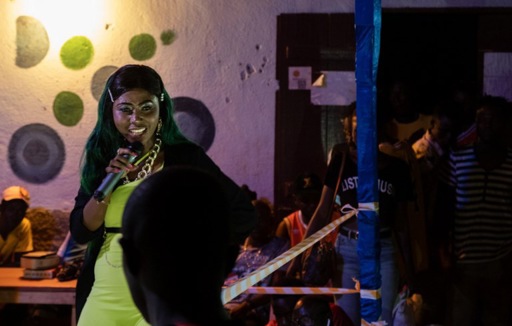Dressed in a fluorescent jumpsuit, high-top sneakers, and full of confidence, the young singer with sparkling eyes grabs the microphone and goes on stage.
Princia Plisson delights her audience of teenagers in a bar in one of the most disadvantaged neighbourhoods of Bangui, the Central African Republic's capital. “Our love is validated, for me baby you are my number one…”, she sings.
The crowd sways as it takes up the lyrics of her song, “Validé,” laced with hip-hop and afro-beat sounds, the result of a collaboration with Cameroonian singer Petit Pays.
With more than 4,500 followers on Instagram, this 27-year-old singer and influencer, better known as “Cool Fawa” or “cool girl”, is among the most followed artistes on social networks in the Central African Republic, wracked by civil war for nine years now.
She sings mainly in French, with touches of the local vernacular, Sango, and English. Her best-known title, “On va se marier” (“We’re going to get married”), was released in 2018. It has more than 50,000 views on Youtube.
Famous among young people, she sings mainly about love and male-female relationships, opting for a “zouk-love” rhythm because, she explains, “it sells” - more than rap, her first love, in which she launched herself in 2010, in an environment devoid of women.
“I was a fan of Diam’s, the French rapper,” she confesses. Determined to rap like her model, she joined a group composed exclusively of men, Civil Servant MC. “At first they didn’t take me seriously, but they ended up accepting me,” she recalls.
Together, they made “revolutionary rap”, using committed texts to denounce societal problems “such as the lack of roads, infrastructure and resources…”
The beginning of her career was turned upside down by the civil war that broke out in 2013, when mainly Muslim Seleka rebels stormed Bangui, driving out President François Bozizé, who had been in power for 10 years.
That plunged the country into a security and political crisis, with a group of mainly Christian and animist militias, the Anti-balaka, opposing the Seleka.
During the crisis, Princia stopped everything. “We couldn’t go out anymore, we were afraid of taking a bullet or being kidnapped,” she recalls in the privacy of her home in the heights above Bangui.
Rap, “is dangerous, it doesn’t pay, and it’s bad for my image,” she says, rolling her eyes.
Refusing to be reduced to silence, Cool Fawa swaps rap for hip-hop and afro-beat music, which is more popular but not necessarily profitable, much like the rest of the Central African Republic’s culture sector.
Being a woman in this environment also means being confronted with sexist behavior, particularly when it comes to finding funding. Despite the difficulties, Cool Fawa does not lose sight of her goal: to release her first album and “become a super star”.

